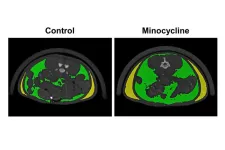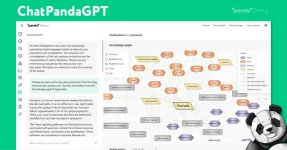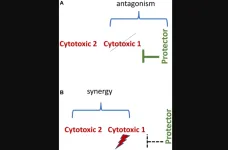(Press-News.org) Unlike other forms of blood cancer, acute myeloid leukemia (AML) cannot currently be treated with CAR-T cell immunotherapy. The reason is that specific molecular targets with which certain immune cells could specifically target AML cells are lacking, which would permit the immune system to attack cancer. Two research teams of Professor Dr. Sebastian Kobold with Dr. Adrian Gottschlich from the Division of Clinical Pharmacology at LMU University Hospital Munich and Dr. Carsten Marr with Moritz Thomas from the Institute of AI for Health at Helmholtz Munich have now succeeded in discovering such targets. The results have now been published in the journal Nature Biotechnology.
AML – one of several forms of leukemia (“blood cancer”) – is a treacherous disease. Five years after the initial diagnosis, only one-third of patients are still alive. Up to 85 percent of patients appear to be cured after intensive chemotherapy. However, in more than half of them, the disease returns within one to two years because the chemotherapy has not destroyed all leukemia cells. In the event of a relapse, a stem cell transplant is the only hope for cure for a patient. But even then, the long-term probability of survival is less than 20 percent. New treatment options are therefore urgently needed.
CAR-T cell therapy is an innovative therapy. CAR-T stands for “chimeric antigen receptor in T cells”. T cells are cells of the immune system. Cancer cells evade their “normal” attempts to attack them by using various molecular tricks. Thus, T cells no longer recognize their opponents, the cancer cells. During CAR-T cell therapy, T cells are first removed from the patients and then genetically engineered to produce a specific protein (CAR) on their surface. When these CAR-T cells are injected back into the patient’s body, these will only engage their target: CD19, which ensures that they recognize the patient’s cancer cells and bind to them in a targeted manner. The cancer cells consequently die.
New targets
However, the approved CAR-T cells against CD19 are not suitable for AML, because CD19 is (usually) not present on the surface of AML cells. Clinical results with CAR-T cells directed against other surface molecules of AML cells have been sobering so far, according to scientists. This is because CAR-T cells were unable to distinguish between healthy and degenerated cells – with correspondingly induced significant side effects.
The physician Sebastian Kobold and the physicist Carsten Marr, together with colleagues from the LMU University Hospital Munich and the Institute of AI for Health at Helmholtz Munich, set out to find alternative molecules that would ideally be found exclusively on the surface of AML cells. With the help of extensive bioinformatic analyses and the integration of expression data from more than half a million individual cells, two candidates finally crystallized out of 25,000 potential cell surface molecules. These are known as CSF1R and CD86. “Such an analysis would not have been possible a few years ago, since the required single-cell data has been generated only very recently,” says Marr, who led the AI-assisted analysis in the study at Helmholtz Munich.
The researchers produced CAR-T cells in the laboratory of the LMU University Hospital Munich that precisely target these molecules. The cells were then tested on different AML models, including AML cells from patients. The results, according to Kobold are promising: “On the one hand, these CAR-T cells are effective against AML, but on the other hand, they hardly destroy healthy cells.”
The study impressively demonstrates how the synergy of interdisciplinary research groups can lead to breakthroughs in health research to treat patients in the best possible way. The researchers’ next goal: They want to develop GMP (good manufacturing practice)-capable processes to produce CAR-T cells that can then also be used in clinical trials with AML patients. This is to take place within the framework of the “Bavarian Cell Therapy Catalyst”, which is supported by the Bavarian Research Foundation. Kobold expects the first tests with patients in two to three years.
END
New targets for CAR-T cell therapy against acute myeloid leukemia through AI-assisted analysis
Interdisciplinary cooperation between LMU and Helmholtz Munich supported by Bavarian Research Foundation
2023-03-13
ELSE PRESS RELEASES FROM THIS DATE:
The fat tax: Long-term, systemic antibiotic use for the treatment of adolescent acne can promote fat accumulation
2023-03-13
A growing body of evidence is showing that the healthy gut microbiome – a community of microorganisms that live together in the gut – influences many aspects of human growth and development, especially during adolescence. While there are many physiologic changes during this time, one of the most outward facing, and sometimes distressing, is the development of acne.
Most individuals treat their acne with topical therapies; however, around 25% of adolescents require systemic antibiotics, such as minocycline, to help to alleviate symptoms and clear up the skin. These systemic antibiotic ...
Insilico Medicine brings AI-powered “ChatPandaGPT” to its target discovery platform
2023-03-13
Insilico Medicine, a clinical-stage generative artificial intelligence (AI)-powered drug discovery company, has integrated advanced AI chat functionality based on recent advances in large language models into its PandaOmics platform. The new feature, “ChatPandaGPT,” enables researchers to have natural language conversations with the platform and efficiently navigate and analyze large datasets, facilitating the discovery of potential therapeutic targets and biomarkers in a more efficient manner. Insilico Medicine is the first biotech company to implement chat functionality using large language models into its AI drug ...
Oncotarget | Selective protection of normal cells from chemotherapy, while killing drug-resistant cancer cells
2023-03-13
“Selective protection of normal cells may transform therapy of cancer.”
BUFFALO, NY- March 13, 2023 – A new review paper was published in Oncotarget's Volume 14 on March 11, 2023, entitled, “Selective protection of normal cells from chemotherapy, while killing drug-resistant cancer cells.”
Cancer therapy is limited by toxicity in normal cells and drug-resistance in cancer cells. In his latest review, Mikhail V. Blagosklonny, M.D., Ph.D., from Roswell Park Comprehensive Cancer Center discusses the theory that cancer resistance to certain therapies can be exploited ...
Agriculture needs fresh approach to tackle insect resistance to biopesticides, new analysis finds
2023-03-13
Insect pests which attack crops have extraordinary powers to develop resistance to greener pesticides and a new way to manage resistance risks is needed, according to analysis by University of Stirling scientists.
For more than 70 years, agriculture’s response to pesticide resistance has been to seek new pesticides in an endless race to keep up with evolving pests.
Researchers now propose a new way to step off this treadmill as farmers embrace the ongoing green revolution in pest control by switching to biopesticides derived from natural organisms.
The evolution of resistance to biopesticides - a crucial tool in ...
Racial health inequality in prostate cancer associated with facility-level disparities
2023-03-13
Racial minorities in the United States are less likely to receive treatment for prostate cancer and, overall, have worse survival outcomes compared to individuals who are white. Typically, patient-level and physician-level factors have been used to explain the racial and socioeconomic differences in prostate cancer disparities. However, a new study led by investigators from Brigham and Women’s Hospital, a founding member of the Mass General Brigham healthcare system, investigated the role of facilities themselves ...
Scientists develop new concepts about the shape and dynamic nature of molecules
2023-03-13
-With pictures-
Scientists have demonstrated in a new study that carbon-based molecules can be much more dynamic than previously thought.
When a carbon atom forms four bonds to different groups, the molecule can exist in two mirror image forms. These mirror image forms are vital in medicine because they have different biological activities.
Usually, it is impossible to interconvert between these ‘enantiomers’ because to do so would require a bond to be broken, a process that needs too much energy.
The researchers ...
Minke whales are as small as a lunge-feeding baleen whale can be
2023-03-13
A new study of Antarctic minke whales reveals a minimum size limit for whales employing the highly efficient “lunge-feeding” strategy that enabled the blue whale to become the largest animal on Earth.
Lunge feeding whales accelerate toward a patch of prey, engulf a huge volume of water, and then filter out the prey through the baleen plates in their mouths. This strategy is used by the largest group of baleen whales, known as rorquals, which includes blue, fin, humpback, and minke whales.
The ability ...
UK scientists discover a new way to help prevent breast cancer ‘time bomb’
2023-03-13
Scientists have discovered why breast cancer cells that have spread to the lungs may ‘wake up’ following years of sleep - forming incurable secondary tumours.
Their research, funded by Breast Cancer Now, reveals the mechanism that triggers this breast cancer 'time bomb' – and suggests a strategy to defuse it.
Patients with oestrogen receptor positive (ER+) breast cancer – the most common type – have a continued risk of their cancer recurring in another part of their body for many years or even decades after their original ...
The right cocktail of gut enzymes can stop c. diff in its tracks
2023-03-13
Not all probiotics are created equal. In a new study, researchers found that certain enzymes within a class known as bile salt hydrolases (BSHs) can restrict Clostridioides difficile (C. diff.) colonization by both altering existing bile acids and by creating a new class of bile acids within the gut's microbial environment. The work could lead to “designer” probiotics that protect against disease by introducing specific BSHs to the gut after antibiotic treatment.
Selecting the right suite of BSH-producing bacteria is critical, because the study found that interactions between BSHs and bile acids ...
Researchers identify novel genes that may increase risk for schizophrenia
2023-03-13
New York, NY (March 13, 2023) – Researchers have identified two previously unknown genes linked to schizophrenia and newly implicated a third gene as carrying risk for both schizophrenia and autism. Led by the Icahn School of Medicine at Mount Sinai, the multi-center study further demonstrated that the schizophrenia risk conferred by these rare damaging variants is conserved across ethnicities. The study may also point to new therapeutics.
The findings were published in the March 13 online issue of Nature ...
LAST 30 PRESS RELEASES:
Scientists reveal our best- and worst-case scenarios for a warming Antarctica
Cleaner fish show intelligence typical of mammals
AABNet and partners launch landmark guide on the conservation of African livestock genetic resources and sustainable breeding strategies
Produce hydrogen and oxygen simultaneously from a single atom! Achieve carbon neutrality with an 'All-in-one' single-atom water electrolysis catalyst
Sleep loss linked to higher atrial fibrillation risk in working-age adults
Visible light-driven deracemization of α-aryl ketones synergistically catalyzed by thiophenols and chiral phosphoric acid
Most AI bots lack basic safety disclosures, study finds
How competitive gaming on discord fosters social connections
CU Anschutz School of Medicine receives best ranking in NIH funding in 20 years
Mayo Clinic opens patient information office in Cayman Islands
Phonon lasers unlock ultrabroadband acoustic frequency combs
Babies with an increased likelihood of autism may struggle to settle into deep, restorative sleep, according to a new study from the University of East Anglia.
National Reactor Innovation Center opens Molten Salt Thermophysical Examination Capability at INL
International Progressive MS Alliance awards €6.9 million to three studies researching therapies to address common symptoms of progressive MS
Can your soil’s color predict its health?
Biochar nanomaterials could transform medicine, energy, and climate solutions
Turning waste into power: scientists convert discarded phone batteries and industrial lignin into high-performance sodium battery materials
PhD student maps mysterious upper atmosphere of Uranus for the first time
Idaho National Laboratory to accelerate nuclear energy deployment with NVIDIA AI through the Genesis Mission
Blood test could help guide treatment decisions in germ cell tumors
New ‘scimitar-crested’ Spinosaurus species discovered in the central Sahara
“Cyborg” pancreatic organoids can monitor the maturation of islet cells
Technique to extract concepts from AI models can help steer and monitor model outputs
Study clarifies the cancer genome in domestic cats
Crested Spinosaurus fossil was aquatic, but lived 1,000 kilometers from the Tethys Sea
MULTI-evolve: Rapid evolution of complex multi-mutant proteins
A new method to steer AI output uncovers vulnerabilities and potential improvements
Why some objects in space look like snowmen
Flickering glacial climate may have shaped early human evolution
First AHA/ACC acute pulmonary embolism guideline: prompt diagnosis and treatment are key
[Press-News.org] New targets for CAR-T cell therapy against acute myeloid leukemia through AI-assisted analysisInterdisciplinary cooperation between LMU and Helmholtz Munich supported by Bavarian Research Foundation




